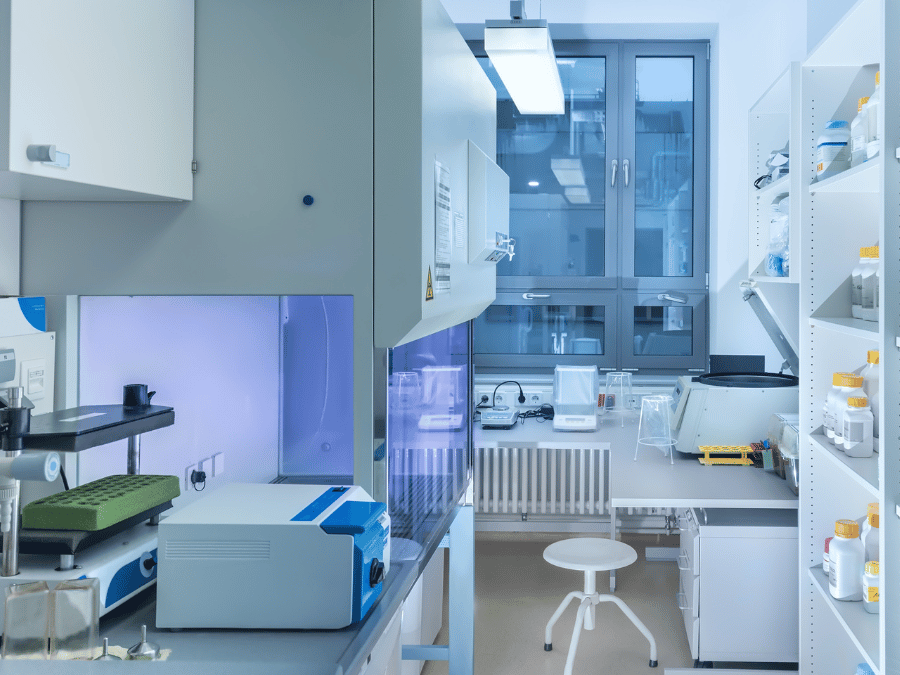HEPA filters are commonplace in many industries and anywhere air is being circulated. It is important that these systems are tested annually. If your HEPA filter is in a microbiological safety cabinet (MSC), then fumigation will be required before testing or servicing can take place. This is often the case in medical, pharmaceutical or research establishments. As the containments could be live, it is imperative that cabinets are safely fumigated before we can begin any testing or servicing work.
Why is Fumigation Important before MSC Testing?
It is essential to have your system tested once every 14 months in accordance with COSHH regulations. Under ISO 16170 regulations, HEPA filters must be tested after they have been disturbed and is normally done during a system service. Microbiological safety cabinets are used to maintain control and prevent cross-contamination when handling organic and biological substances. This means that testing and servicing can be dangerous if the correct precautions, such as prior fumigation, is not carried out. In order to safely carry out testing and servicing, the HEPA filters must be free of dangerous viruses, particles or bacteria.
What is the Fumigation Process?
At Vent-Tech we use Hydrogen Peroxide for fumigation, which is a lot cleaner and safer than the alternative, Formaldehyde. The first part of the process is to seal the area that requires fumigation, this could be just sealing the biological safety cabinet or the doors to the room if a whole room needs fumigation. The space being fumigated is then flooded with Hydrogen Peroxide. Using specialist equipment we wait until the air sample reaches 100% Hydrogen Peroxide saturation. Once this is done our engineers take swabs from key surfaces in the room or microbiological cabinet, such as the external side of the filter, to ensure the area is fully saturated.
What is the Process for HEPA Filter Testing?
HEPA filter inspection should be carried out every time they are disturbed in order to maintain safety. First of all, the engineers will ensure it is safe to work on the system, this may require fumigation or the use of specialist PPE. If a thorough examination takes place this does not require the filters to be removed. Instead they are tested to see if replacing the filters is needed.
How do we Test HEPA filters?
Testing HEPA filters isn’t the same as a normal LEV test and requires extra knowledge and equipment. We use a specific HEPA filter testing kit to ensure that H13 and H14 HEPA filters are properly inspected. A known quantity of oil mist (dispersed oil particulate, or DOP) is released upstream of the filter. A scanner or probe is then located downstream to measure how much of the oil mist is able to make it through the filter. H14 filters must be at least 99.995% efficient, so any reading above 0.005% would be considered a failure and is unsafe.
HEPA Filter Servicing
Like the process for filter inspection, fumigation may be required for safe servicing. After this, the filters can be removed, replaced with new filters and then a HEPA filter test is carried out.
KI-Discus Test
KI-Discus is a quantitative assessment carried out when servicing a microbiological safety cabinet. KI refers to potassium, and this is what is used for the testing. The potassium is applied to a spinning disc within the fume cupboard, the KI droplets are released into the cabinet. At the face of the cabinet there are four sensors to measure if any potassium escapes the cabinet.
Why Choose Vent-Tech?
Vent-tech is led by Adrian Sims, one of the most respected figures in the industry. Under his guidance and with years of experience, our team of engineers are highly trained and possess the knowledge and skills to make sure your equipment is running at its optimum efficiency and most importantly, keeping you safe. We use top of the line calibrated equipment to ensure the safety of your microbiological cabinets and are the only ILEVE accredited partner providing full microbiological cabinet fumigation and inspection in accordance with BS EN 12469.
To find out how we can help you, please call the team on 0117 964 7945 or fill out our contact form below and we will get back to you shortly.


